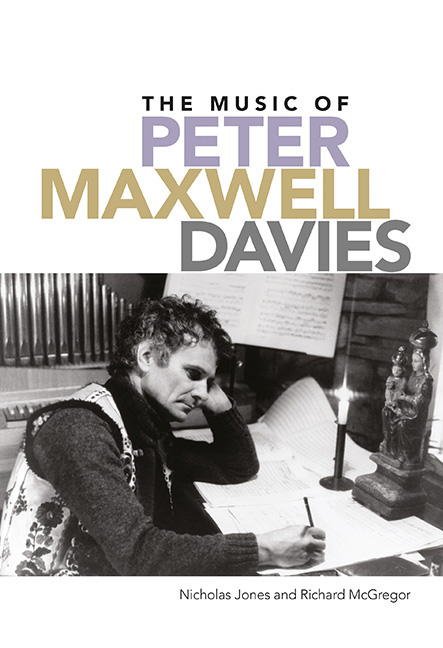Book contents
- Frontmatter
- Dedication
- Contents
- List of Illustrations
- Acknowledgements
- Prelude
- 1 Biography, Stylistic Development, Autobiography
- 2 Compositional Technique and Process
- 3 Genre
- 4 Form and Architecture
- 5 Tonality and Texture
- 6 Allusion, Quotation, Musical Critique
- 7 Landscape and Place
- Postlude
- Catalogue of Works
- Select Bibliography
- Index of Works by Peter Maxwell Davies
- General Index
6 - Allusion, Quotation, Musical Critique
Published online by Cambridge University Press: 27 March 2020
- Frontmatter
- Dedication
- Contents
- List of Illustrations
- Acknowledgements
- Prelude
- 1 Biography, Stylistic Development, Autobiography
- 2 Compositional Technique and Process
- 3 Genre
- 4 Form and Architecture
- 5 Tonality and Texture
- 6 Allusion, Quotation, Musical Critique
- 7 Landscape and Place
- Postlude
- Catalogue of Works
- Select Bibliography
- Index of Works by Peter Maxwell Davies
- General Index
Summary
The three aspects of this chapter are not mutually exclusive in Davies's music. They all interact with and through each other, depending on the work, and evoke musical or extra-musical associations, or, have some kind of symbolic significance within the context of the work. Of all the allusions which pervade Davies's music the most obvious, and perhaps the most ubiquitous, is his use, or rather, re-use of music from the past, principally plainsong, but by no means limited to that source. Sometimes Davies uses direct quotation, but much more often the earlier music is alluded to through the generating mechanisms of the particular composition frequently carrying symbolic significance contributing to the ‘meaning’ of the work.
In the late 1960s and early 1970s music by earlier composers was juxtaposed against Davies's own modernist language, often in an exaggerated way that was perceived as parody at the time, although as I have argued elsewhere the actual musical effects are more precisely paraphrase and pastiche. Indeed Davies's use of pre-existing music became an implied source of criticism of his music throughout his career: why should the so-called 1960s ‘enfant terrible’ of British music feel the need to increasingly root his music in materials from the past? The answer, as with all questions relating to Davies's musical decisions, is not simple, particularly since the ideas developed at that time would underpin much of his subsequent work, often latterly in a much more subtle way than the provocative gestures of the 1960s.
THE SIGNIFICANCE OF PLAINSONG AND SYMBOLIC ALLUSION
There is, above all, one recurring reference to music of the past in Davies's output: he used the same, or closely related, generating plainsongs in different works throughout his career, in particular those for Pentecost, such as Veni Creator Spiritus and Dum Compleréntur. The former, and related chants, underpin such diverse works as Veni, Sancte Spiritus (1963) and the Eighth Symphony (2000). This can hardly be an ongoing homage to Mahler, but rather it must be a kind of invocation to the creative spirit. The first obvious use of a generating Pentecost plainsong, in this case, Dum Compleréntur, is to be found in Alma Redemptoris Mater, written in 1957.
- Type
- Chapter
- Information
- The Music of Peter Maxwell Davies , pp. 208 - 250Publisher: Boydell & BrewerPrint publication year: 2020



